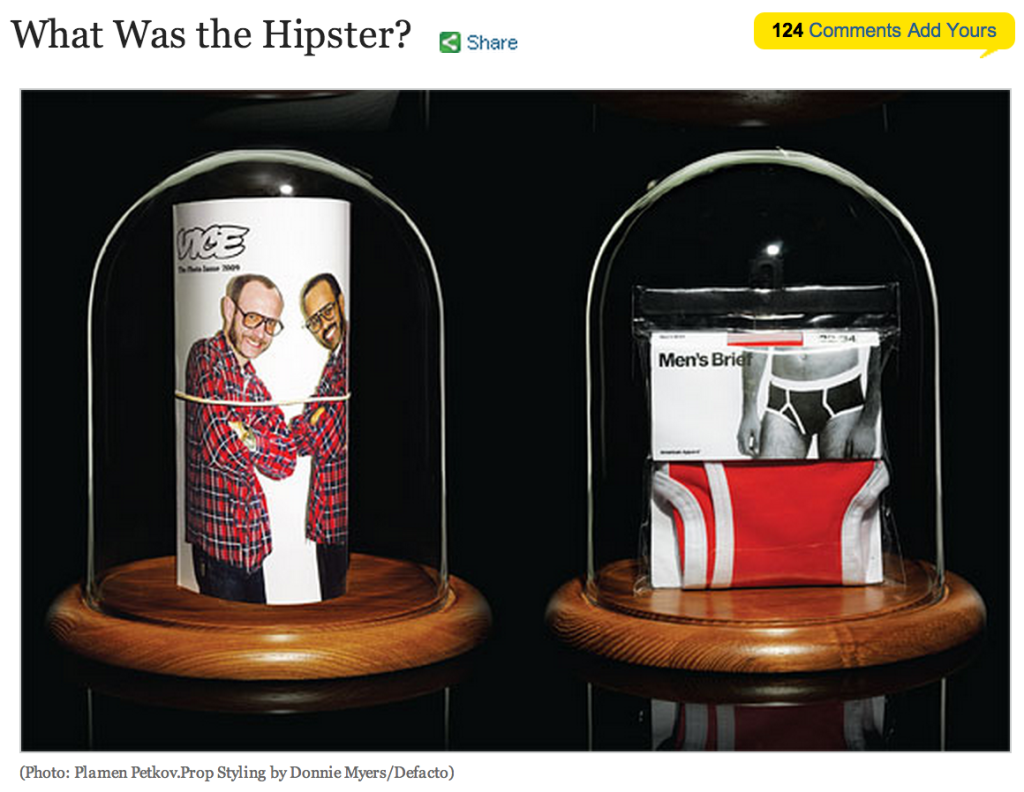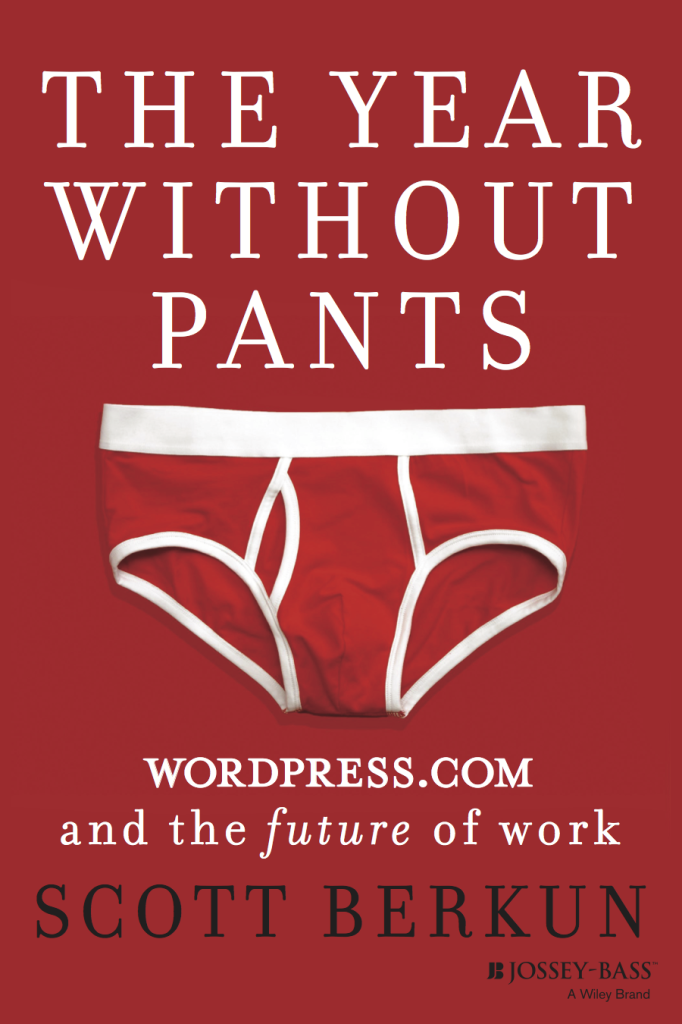I discovered this eye-catching book amidst my mail, and of course it sparked instant curiosity. A bright red book with a suggestive cover…who wouldn’t push their boring bills aside to further investigate?
First Impressions
I have to admit, American Apparel is what immediately came to mind. An urban art school grad, I’m among American Apparel’s prime demographic, so the fact that I instantly thought of the overpriced hipster brand speaks more to the brand’s aggressive (though clearly effective) marketing than to the design of the book cover. But many WordPress users are in this same cultural sphere, subjected to the same references, so it’s worth mentioning.
The iconic red underwear featured on the cover of the book is practically a symbol of a certain generation and aesthetic. Similar images have been quite prevalent (though peripherally) in my daily consumption of media—online, in magazines, on billboards—for almost half of my lifetime.
The red brief screams “youth,” “irony,” “androgyny,” and even “recklessness” Was this intentional? I doubt it.
I scanned the text, wondering what on earth American Apparel was doing sending me a book. I realized the font was not Helvetica, and the subtitle sunk in first: WordPress.com and the future of work.
Okay, now I know what this is! It’s the book about “working at WordPress.com” (Automattic) that I’ve been expecting in the mail. Not quite what I pictured. But hey, we all know what they say about books and their covers.
My gaze went back up to the title, The Year Without Pants. Alright…that’s cheeky. I type-thought to myself “LOL” as if I were still communicating via chat, because I had been all day. I’m sure many of you can relate.
Whether you’re a WordPress designer, developer, user, enthusiast, or really anyone who spends time within this unique community or ecosystem, you’ve probably spent lengths of time without pants on too…and possibly even thinking to yourself in chat-speak. Well now you can be rest assured—you are not alone.
The Read Itself
I started reading The Year Without Pants the same afternoon it arrived. Still in work-mode—pen and highlighter in hand—I started off taking notes to make sure I followed the order of events, and highlighting references I wanted to look up later. Since I haven’t been in the WordPress community that long, I had a feeling I might be unfamiliar with some of the people and facts. So I was eager to dive in and learn…hard.
Something happened though. I got sucked in. And I relaxed. I completely lost track, intellectually, and soon found myself reading leisurely along as if I were laying in the park solo, under a tree on a sunny day. I even chucked out loud whenever I found something funny—which ended up happening a lot.
To my delight, The Year Without Pants ended up being an engaging and witty page-turner—a truly genuine and insightful joy to read. I couldn’t help but visualize the future cast members of the imaginary indie film version in my head.
When it comes down to it, the brilliance of this book lies in its storytelling. Despite what I set out to do in the beginning (learn a lot, and maybe critique), less than a third of the way through I found that I wasn’t consciously reading to learn at all, or even critique; I was reading to feel.
Which, for me, means that I’m reading an excellent book (and probably learning more than I would anyway if I was *trying*).
The Style
As author Scott Berkun explains in the beginning of the book, when Matt Mullenweg—co-founder of WordPress and founder of Automattic—asked him to join the company, Berkun said he’d do it…if he could write a book about his experience. And Mullenweg, known for his unconventional business choices, was game.
In what Berkun calls a “participatory journalism” approach, The Year Without Pants chronicles his WordPress.com journey, beginning to end, with a captivating sense of no-holds-barred honestly.
The Plot
The book is a fairly intimate first person account of Berkun’s time spent working at Automattic as lead of Team Social, which was responsible for a handful of successful products including Jetpack, one of the most popular WordPress plugins in history.
Berkun worked closely with Automatticians Mike Adams, Beau Lebens, Andy Peatling, and Hugo Baeta (to name a few). Details of the relationships between colleagues are shared generously as Berkun takes us through the ups and downs of leading Team Social’s various projects, managing meet-ups across the globe, and navigating the previously unchartered (for him) waters of joining a distributed company and leading a remote team.
Is this a Business Book?
Yes, it is a business book in the same way I see Tina Fey’s Bossypants as a business book (okay, that’s a hyperbole). But this is also my favorite type of business book. There are so many nuggets of wisdom interspersed throughout the story itself, which—first and foremost—is a highly entertaining and relatable memoir.
When Berkun segues into theoretical business discussions, it’s never pedantic or dry. He’s thorough, without talking down to the reader–which can be a difficult chord to strike. All of the ideas that Berkun ponders and deconstructs have real-life examples to back up the discourse.
Plus, Berkun is the first to admit that he is not the be-all and end-all of business advice. He simply shares his experiences and his thoughts (mistakes and all), while taking the reader through them naturally and humbly…yet astutely.
Is the Author on a WordPress Soap Box?
I think it’s important to share that this book is clearly not meant to serve as some sort of cheerleader for WordPress, WordPress.com, Automattic, or Matt Mullenweg. The author shares the good, the bad and the ugly.
From admitting that the company’s P2 communication network made him uneasy at first: “The sense of Big Brother and faceless competition was hard to shake,” to his definition of “Matt bombing“—when Mullenweg jumps into an online team discussion and throws everything off, only to disappear and leave everyone confused—we know that Berkun is not afraid to speak candidly.
It’s also interesting that Berkun calls out the fact that Automattic is very tight-lipped about its hiring process and compensations…despite the company’s frequent assertions around the importance of “transparency.” If Berkun’s intentions were as simple as tooting Mullenweg’s horn and passing out some WordPress Kool-aid, then he probably wouldn’t feel comfortable pointing out such hypocrisies. All of these details add to the book’s authenticity, and the journalistic integrity of the author.
On the other hand, Berkun eloquently describes what made this work experience unique and unforgettable. He shares Mullenweg’s offer letter, which I’m not going to spoil for you; you just have to read if for yourself (page 39). For Berkun, who is a writer at heart, the importance of doing work that has meaning is a theme throughout, and his time at Automattic was aligned with this core value. The chance to work in an environment that both a) offers freedom and b) instills pride is not only rare but ideal (in my opinion) and Berkun attributes this privilege to his time at Automattic.
Conclusion
I recommend this book to every single Torque reader. I also think there are many stories and examples within the book that we can discuss and learn from. Topics like:
1. Why working remotely demands greater communication skills and social proactivity
2. How spending time “in the trenches” can make a stronger leader
3. Data-driven culture vs. data-influenced culture; the importance of both analysis and intuition
4. Separating the supporters from the makers and seeing management as a supportive role
5. The importance of friction for innovation
And there are many more…
Lastly, I’ll leave you with a few of my favorite quotes:
It sometimes takes ugly effort to make beautiful things.
Passionate people love to feel like empowered underdogs.
Sometimes talent, chaos and chemistry are all you need…
Enjoy the book! You can order it here. I can’t wait to hear what you all think.




4 Comments
Join the conversation